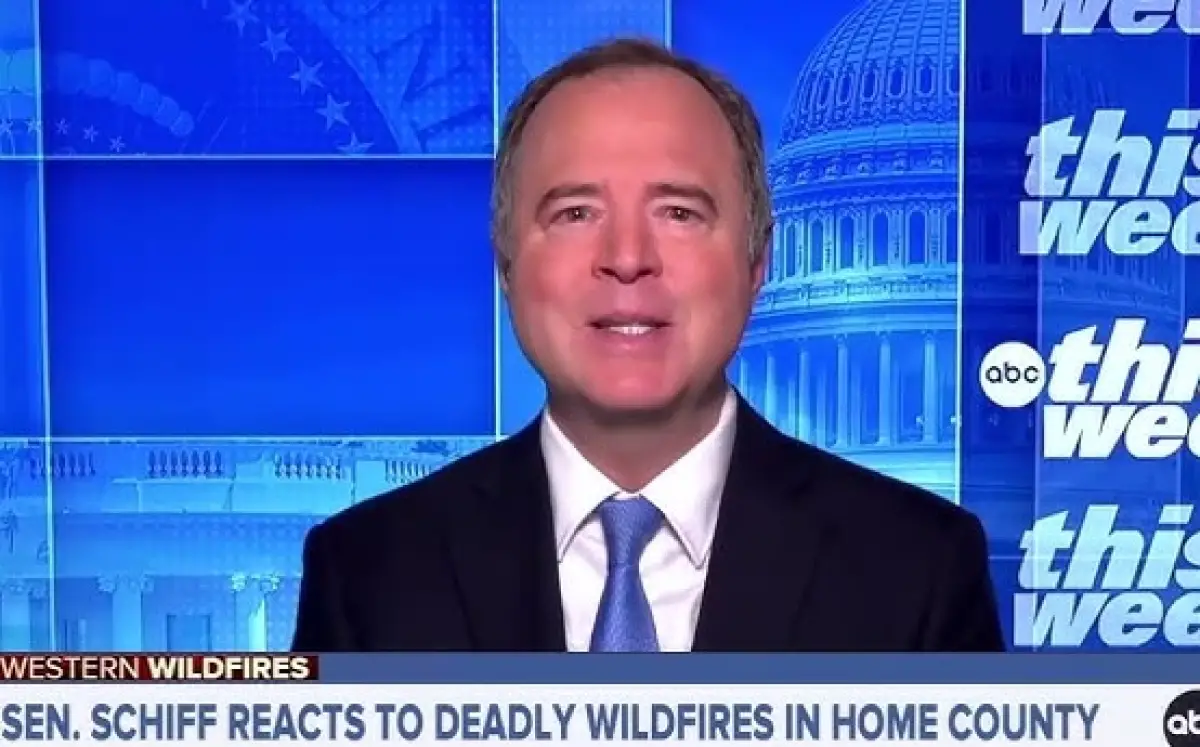California Senator Adam Schiff recently found himself in the spotlight for making a controversial statement regarding wildfire mitigation efforts during a live interview on ABC. The discussion revolved around a crucial water reservoir in Pacific Palisades, with a capacity of 117 million gallons, which had been out of commission for months. Critics have pointed to the state’s failure to maintain this resource as a contributing factor in the struggles to combat recent wildfires in Los Angeles.
The interview began with questions about the depleted fire hydrants reported during the early stages of the Los Angeles wildfires. ABC’s anchor raised concerns about the inactive reservoir, asking Schiff, “Why did so many of those fire hydrants simply run dry? Was the 117-million-gallon reservoir in the Palisades, which was out of operation, part of the issue? What’s your understanding of this situation?”
In response, Schiff offered a preliminary assessment, stating, “My initial take—and I do want a thorough review of this to fully understand—is that the reservoirs were ‘full’ at the start of these fires.” He further clarified, “From what I know, the 3-million-gallon reservoirs being utilized in the Palisades were fully operational at the time the fires began.”
However, Schiff also appeared to downplay the reservoir’s potential impact, given the scale of the wildfires and the extreme weather conditions. “These reservoirs are designed to handle localized fires, maybe protect homes or small clusters of buildings. But when entire towns are engulfed in flames, particularly with hurricane-force winds reaching up to 100 miles per hour, their capacity becomes negligible,” he explained.
Immediate Backlash
Schiff’s remarks were met with swift criticism, especially on social media. A prominent conservative account, I Meme Therefore I Am, shared a clip of the interview, accusing Schiff of misleading the public. “Adam Schiff appeared on national television and misled the American public once again, claiming that the reservoirs ‘were full at the initiation of these fires,’” the post read.
The account also shared a screenshot of an NBC News article titled, ‘Reservoir in Pacific Palisades was out of commission when fires started.’ The article contradicted Schiff’s statement, revealing that the reservoir had been inactive since February due to maintenance work, leaving its massive 117-million-gallon capacity untapped during the crisis.
The Governor’s Reaction
In response to the growing controversy, California Governor Gavin Newsom called for an official investigation into the water supply issues in Los Angeles. “We need a full understanding of what went wrong and how we can prevent this from happening again. Access to water is critical in any firefighting effort,” Newsom stated during a press conference.
The governor’s call for accountability further highlighted the importance of infrastructure maintenance, particularly in fire-prone regions like California. Analysts argue that this incident underscores systemic issues in resource management that need immediate attention to safeguard communities against future disasters.
Examining the Facts
Reports indicate that the Santa Ynez Reservoir, located in the Pacific Palisades area, has been offline for nearly a year due to cover repairs. This rendered the 117-million-gallon storage facility useless during one of the most critical wildfire seasons in California history. Critics contend that the government’s failure to prioritize repairs reflects a broader pattern of neglect.
A simple online search corroborates this timeline. Investigations are ongoing to determine why the reservoir remained out of service despite warnings about the escalating fire risks. Additionally, firefighters have noted that depleted hydrants during the Los Angeles wildfires significantly hampered their ability to control the flames, potentially exacerbating the damage.
Climate, Infrastructure, and Accountability
Schiff’s explanation centered on the challenges posed by extreme weather conditions, such as high winds, which can prevent aerial firefighting operations. While it is true that such conditions complicate firefighting efforts, critics argue that having a fully functional reservoir could have made a significant difference. Water accessibility, especially during the critical early hours of a wildfire, is essential in containing and mitigating the spread.
This controversy highlights a recurring issue in California’s wildfire preparedness: the intersection of climate change, aging infrastructure, and political accountability. In recent years, the state has faced increasingly severe wildfires, fueled by rising temperatures, prolonged droughts, and strong winds. Addressing these challenges requires not only immediate action but also long-term investments in resilient infrastructure and better resource management.
The Role of Public Discourse
The backlash against Schiff’s statements demonstrates the power of public scrutiny in holding leaders accountable. Social media platforms have become a battleground for debates about government responsibility, with users demanding transparency and evidence-based responses. Schiff’s critics argue that his comments were either a deliberate attempt to mislead or a result of insufficient information, neither of which inspire public confidence.
Supporters of Schiff, however, have pointed out that his call for a comprehensive review shows a willingness to address the issue openly. They argue that pointing fingers without understanding the full context risks oversimplifying a complex problem.
Moving Forward
As California continues to grapple with the growing threat of wildfires, the importance of robust infrastructure and proactive governance cannot be overstated. The controversy surrounding the Palisades reservoir serves as a stark reminder of the need for better planning and maintenance of critical resources.
Moving forward, officials must prioritize transparency and collaboration to rebuild public trust. This includes providing timely updates on ongoing investigations, addressing maintenance backlogs, and investing in systems that can withstand the pressures of climate change.
For residents of fire-prone areas, this incident also underscores the importance of community preparedness. Simple measures, such as creating defensible spaces around homes and staying informed about local fire risks, can make a significant difference in protecting lives and property.
While the debate over Schiff’s remarks continues, one thing remains clear: California’s fight against wildfires requires a united effort, combining government action, community resilience, and accountability at all levels.

